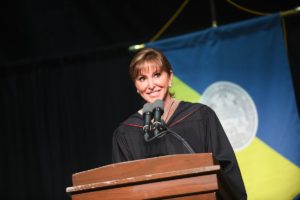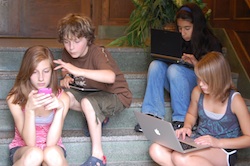Commencement Address given by Deborah L. Tarrant
University of Vermont, College of Education & Social Services, Class of 2018
Thank you, all, very much. Dean Thomas, thank you for your invitation to be part of this special day. I’m humbled and honored.
And Dr. Bishop, thank you for that lovely introduction. I appreciate you mentioning my family history. If I can take poetic license with an old, well-known country song, “I’m proud to be a coalminer’s granddaughter.”
As Dr. Bishop mentioned, my connection to the College is through the Tarrant Institute for Innovative Education. Because of this connection, I’ve had the pleasure of working with Dr. Penny Bishop for the past 13 years. If you know her, you know what an asset she is to this University. It was her dedication and that of her Associate Director, Dr. John Downes, that kept the vision moving forward in the early days of the Tarrant Institute.
Those of us associated with the Institute believe it speaks to a new paradigm for learning – one that will have a direct impact on many of your careers. The catalyst for what started as an experiment and ultimately became the Tarrant Institute was the observation that for quite a few middle school adolescents, particularly boys, traditional teaching methods were not working very well. Being expected to sit passively for hours and learn the same way kids had learned for the past century, was becoming less and less effective. Think about it – some of you were in middle school about that time – these young people were spending their leisure time immersed in new technology. It’s no wonder their attention drifted at school.
My husband, Rich, and I had a vision for what a 21st century classroom could look like. With Dr. Bishop’s help, we started with one class at one Vermont middle school with students who didn’t seem to like school very much, and who spent a lot of time in the principal’s office.
The idea was to engage them while they were in middle school, before they became problematic high school students. The plan was for technology to be the hook, but we knew from experience that just dumping laptops or notebook-devices into classrooms was NOT the answer. The answer was to use computers as learning tools in a way that would engage these technology-hungry adolescents.
As it turned out, the learning curve was really steep – for the teachers! The kids took to the new environment instantly. And, why wouldn’t they? They were surrounded by technology everywhere except at school!
This pilot program immediately turned disengaged students into eager learners. An unanticipated outcome was that other students started looking up to the kids in the program because of their computer expertise. All of a sudden, the program students had a sense of pride and accomplishment they had never before associated with school. In that first year, not one of those kids who had been regulars in the principal’s office needed disciplining. Not one! And parents were absolutely amazed by the eagerness of their kids to go to school.
I’ll never forget the day we visited the pilot classroom late in that first year, and a young man who was obviously older than the other students approached us. It was apparent, he had been held back at least once, maybe twice. Very shyly, he reached to shake hands with Rich. Then he raised his head and looked Rich right in the eye. All he said was “Thank you.” But the emotion in those two little words was so powerful!
It didn’t take long for all the students in that first middle school to want to be part of the program. So the experiment was a success from the beginning, but right away, it was obvious the main challenge to expanding the program was the ingrained idea that teaching could only be done by lecturing to silent, immobile students.
This realization was the eureka moment when the focus of the Tarrant Institute changed from the students to helping teachers transition to innovative ways of using the magic of technology in the classroom.
In preparation for being here today, I came across two quotes that are especially relevant to this new paradigm. The first is, “If a child can’t learn the way we teach, maybe we should teach the way they learn.”
The origin of this quote is widely debated, however, the second quote is unquestionably attributed to Dr. John Dewey, a well-known education reformer with whom many of you are familiar.
Dewey was born before the Civil War, in 1859, just a few blocks from here. He graduated from UVM 139 years ago. He lived to be 93, and fittingly, he’s laid to rest right here on UVM’s campus. His is the only gravesite on the campus.
Here’s what Dewey said: “If we teach today’s students as we taught yesterday’s, we rob them of tomorrow.” Bingo! Dr. Bishop and her team are literally changing the way we educate, just as Dewey envisioned.
We’ve all heard that learning is a life-long process. Experienced teachers learning new methods using technology in the classroom are perfect examples of this. In my case, three years ago, life unexpectedly presented me with a whole new ball game as Mayor for the Town of Hillsboro Beach. My professional experience was in the world of fashion and in the corporate world. Believe me, spending my golden years in the political arena was never part of my master plan!
In thinking about the message I wanted to leave you with today, it struck me that while my role as Mayor is a very visible position of leadership, as graduates of the College of Education and Social Services, you will be leaders the minute you step into your first classroom or office. Typically, graduates in other majors do not have this level of leadership responsibility right out of the chute. Getting a business degree and overseeing financial assets is one thing, but the degree you receive today will make you responsible for something far more valuable – human capital.
The Hippocratic Oath for physicians is the earliest expression of medical ethics in the Western world. Paraphrased, its most important tenet is, “First, do no harm.” If there was an equivalent doctrine for educators, social workers, and counselors, it would have to go one step further. Not only are you expected to do no harm, you are expected to prepare your charges to be contributing members of our society.
Most of you will play many roles in your new careers: teacher, mentor, advisor, role model, and sometimes even surrogate parent. What often goes unacknowledged, is that your role as a leader, and the influence that role inherently has, carries over into every one of those other roles. A leader is defined as “one who directs by influence.” As leaders, the influence you have on the lives you touch will shape our country for years to come.
It’s a huge responsibility – having influence over young people and people in need of social services. These are the most impressionable and vulnerable segments of our population. The human capital you will be responsible for is our country’s most important asset. Accordingly, your challenge will be to handle your leadership role carefully – and – judiciously.
Today is the official beginning of this leadership role. This graduation is your springboard. Regardless of what has come before this day – regardless of how or where you grew up, regardless of your GPA – after today, your place in the world will be up to you.
In the immortal words of Dr. Theodore Seuss Geisel, better known simply as Dr. Seuss: “You have brains in your head. You have feet in your shoes. You can steer yourself any direction you choose. You’re on your own. And you know what you know. You are the one who’ll decide where to go.”
This is a momentous day! And I’m honored to share it with you.
To parents, grandparents, and loved ones of the graduates: congratulations! And thank you for the sacrifices you made to get to this day.
And finally…, to the graduates: savor this moment! You’ve worked hard. You’ve survived Vermont winters … and … You made it!
This is your day! Congratulations! Thank you!
Deb Tarrant is the Vice President of the Richard E. and Deborah L. Tarrant Foundation and Mayor of Hillsboro Beach, FL. Her grandfather started working in the coal mines of Harlan County, KY at age 10, and her grandmother left school after the 7th grade to help support her family. Deb is the first member of either side of her family to earn a college diploma. She graduated summa cum laude with a degree in marketing and accounting from Miami University in 1979.




 @tarrantgiving
@tarrantgiving